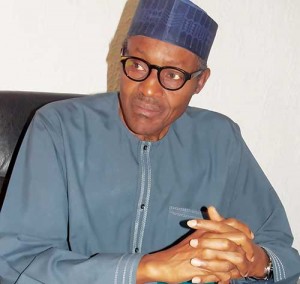Outcry over public officers’ salary has risen, now that the treasury has gone burst, writes Correspondent SAM NWOKORO.
The emoluments of Nigeria’s political office holders may have served the purpose the original planners intended for it: make public officers secure and concentrate on their work with minimal distraction.
But the treasury is now empty and cannot sustain the wage bill. In any case, why does corruption persist in spite of the huge sums the Revenue Mobilisation and Fiscal Allocation Commission (RMFAC) pays public officers?
One could discuss the twin issue of public officers’ pay and corruption in drinking bars, on newsstands, at village meetings, or on public buses.
Nigerians of every hue and party affiliation want to see the remuneration drastically slashed. Political leaders themselves have realised the inevitability.
People are watching how President Muhammadu Buhari will go about it when the predilection of the elite is for flamboyance and exhibitionism in a country notorious for greedy accumulation of wealth.
Reasons for complaint
There are many reasons why people are alarmed at the pay packet of public office holders, one of which is the grievance of organised labour.
Another reason is that Nigeria’s main revenue earner, crude oil, has witnessed a price plunge since October 2014. From a high of $118 per barrel (pb) between 2013 and the middle of 2014, the price nose dived to about $50 pb at the end of 2014.
Added to this is the fact that the Goodluck Jonathan administration awarded many infrastructure contracts; some completed, some half completed, and others not even started at all – such as power supply, dam construstion, seaport dredging, airport remodeling, new highways and rehabilitation of old ones.
Most of these contracts are being executed under public private partnerships (PPPs), meaning that the treasury has a lot of backlog of demand for funds from project partners.
There is a proposed building of six green refineries, one in each zone in the country. Some have been ceremonially flagged off after all terms of technical agreements have been signed with project partners.
The remodeling of airports in line with the standard of the International Civil Aviation Organisation (ICAO) is ongoing.
The agreement between Abuja and the Academic Staff Union of Universities (ASUU) on the funding of tertiary education, especially federal universities and polytechnics, has not been fully implemented.
Last year, ASUU paralysed academic work in higher institutions because the government has not fulfilled its own part of agreements signed in 2009 on funding research and infrastructure in universities.
ASUU suspended the strike because of the election in March this year.
The Nigeria Labour Congress (NLC) had warned several times that it would call a strike if the government failed to raise the national minimum to N90,000 per month before the end of 2014.
The Nigerian Medical Association (NMA) only shelved its nationwide strike planned for May this year to allow for the inauguration of Buhari.
Rubbing salt on injury
Nigerian public officers are the highest paid in Africa, and rank among the highest in the world.
The schedule dubbed “Consolidated top Federal Public Office Holders Salary Structure” (CONTOSOL) administered by the RMFAC shows that the president earns over N4 million a month aside security vote and perks.
The salary of the president is over N14 million per year aside security vote, entertainment vote, travel estacode, and other allowances.
The vice president earns a little less, but with an assortment of perks which when piled together is double the yearly salary.
Public officers themselves seem not to be bothered by the public outcry against what they take from the same treasury which they shout is empty.
A few days after the inauguration of the eighth National Assembly (NASS), the 469 legislators in both Chambers jostled for their wardrobe allowance for which the 2015 budget provided N9 billion.
RMFAC, cake sharer or fiscal planner?
Development partners and foreign governments have ridiculed Abuja over the cost of governance since the return of democracy in 1999.
The World Bank in its 2014 development report said: “Nigeria’s parliamentarians are about the most paid in the world, with each MP earning as much as twice or more than the annual salary of United States president, aside sundry emoluments.”
The United Nations Development Programme (UNDP) raised the alarm that “much foreign aids given to African countries, including Nigeria, end up in the pocket of government officials with active collaboration of rouge legislators.
“In Nigeria, wage system is biased for political elite, most of who dodge tax payments through rouge networks with government officials.
“The [RMFAC], Nigeria’s body in charge of wages of political leaders, does not by law bother itself about the finances of government.
“While there have been earlier warnings since 2008 after the world economic melt-down that Washington and most Asian customers of Nigerian crude oil might be cutting their demand from 2010, the RMFAC as late as 2008 increased a second time in less than six years the pay of Nigeria’s public office holders.
“Unless the most populous country in Africa restructures its government operation and trims its bureaucracy, her economy might collapse under the weight of unpaid wages to political leaders and civil servants.”
Irritating perks
In the last salary increment, the monthly pay of a senator was raised from N993,697 to N2.4 million, a member of the House of Representatives from N794,048 to N1.98 million, and a state lawmaker from N794.084 to N1.9 million.
Allowances include vehicle (30 per cent to 75 per cent), entertainment (10 per cent to 30 per cent), utility allowance (20 per cent to 30 per cent), wardrobe (25 per cent of basic pay), personal assistant (26 per cent), domestic staff (75 per cent), recess (10 per cent), and newspaper (15 per cent).
These figures are different from what the RMFAC officially approved for lawmakers.
With six months left in the 2015 fiscal year, the NASS is yet to settle down to the nitty-gritty of legislative business. It has rendered the executive arm inept.
Jemmy Omotayo, an investment banker, said: “Revolutions are made in the interest of the masses all over the world, not in the interest of a few. I think what the RMFAC has done regarding the perks of our public officers is evolution, not revolution.
“Infrastructure is in a deplorable state. Most roads are yet to be fully rehabilitated. [Jonathan] embarked on a lot of road projects rehabilitation, but could not finish them before he left office.
“Power supply is nearly absent and the nation is moving towards total darkness. And a party that prides itself as a change agent has not been able to constitute a government, much less legislation, four weeks after assuming power. It is baffling.”
The NLC had also raised the alarm when the salary scale for public office holders was being packaged.
“We have had cause in the past to stridently protest against the salaries and allowances of political office holders even before the outlandish and extravagant increases they arrogated to themselves last year (2008) through the instrumentality of NASS and RMFAC,” the NLC said.
There are calls for Buhari to implement the recommendations of the national conference on fiscal administration.
But judging from the behaviour of legislators, he may find it difficult to get them to reduce the salaries and allowances they approved for themselves.














